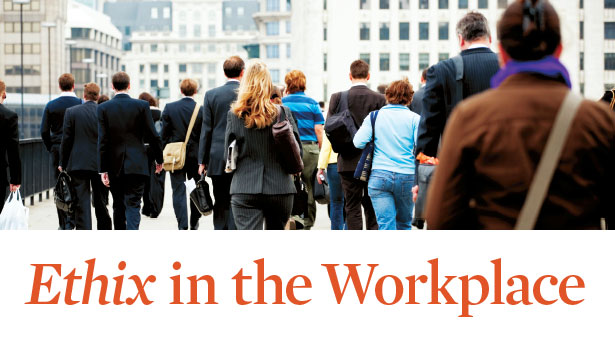
For too many businesses — and business schools — “ethics” are only about reducing risk or escaping additional regulation. But what if ethics were built into the mission of a business? What if ethics meant not merely avoiding the wrong thing but instead making a commitment to do the right thing?
Ethix, the online journal of Seattle Pacific University’s Center for Integrity in Business in the School of Business and Economics, explores these questions by providing positive examples of best practices and exemplary leadership. The journal features in-depth conversations with leaders, including CEOs of Fortune 500 multinational corporations, CEOs of smaller companies worldwide, presidents of academic institutions, and leaders in technology.
Written for a general business audience, Ethix doesn’t always focus explicitly on Christian ethics. Instead, it demonstrates how principles based on the Christian faith can apply more broadly in the marketplace, according to John Terrill, director of the Center for Integrity in Business.
“From my perspective, one of the journal’s strengths is that it serves as a bridge-builder for us in making connections from our faithbased context to the broader business community,” he says.
Ethix began as a print journal in 1998 under the name “The Bulletin of the Institute for Business, Technology, and Ethics,” co-founded by David Gill and Al Erisman.
 Left to right: Barry Rowan, Don Flow, and Bonnie Wurzbacher
Left to right: Barry Rowan, Don Flow, and Bonnie Wurzbacher
At the time, Gill was a professor at North Park University and Erisman was an executive with Boeing. Erisman, now executive in residence in the School of Business and Economics, continues to edit the journal today. Online at Ethix.org, the publication reaches readers around the world with its archive of probing conversations with leaders in business, government, and academia.
“There is a need to continue to call for strong ethical leadership in business, and in spite of the headlines, there are still good models out there,” Erisman says.
In these excerpts from Ethix interviews with Erisman, corporate executives explain how they help their companies and communities to flourish.
As you look at the telecommunications industry, is it all about making money, or is there some other value in the enterprise?
The test for me personally is this: Can I make a connection between what I am doing at this moment and my purpose in life? It doesn't count to say that I make money and give it away and thereby make the world a better place. Simply going about the business of business, providing goods and services that are of help to people, must be at the heart of our understanding of contribution. And this perspective can be applied to making soap, providing telecom services, or growing food. Virtually anything short of chemical weapons, looked at through a proper lens, can be seen as creating value for a society. Said differently, I have come to see that the primary purpose of business is to serve.
Barry Rowan, Chief Financial Officer, Vonage Holdings Corporation
People don't generally put “auto sales” and “ethics” in the same sentence. How do you link the two?
The traditional model in the automobile business is laissez-faire capitalism: a transaction where both parties try to maximize their own position. We try to change that model and ask, “How are we serving the customer?” Our sales process is totally different from most others in the car business. At most of our stores, there’s no negotiation. The price is given right up front. You don’t have to be a tough negotiator or more educated to get a fair price. We also have a number of unconditional service commitments. If we do not repair your vehicle correctly the first time, you don’t pay for additional repair. We make a commitment to complete the repair at the time promised, and when we give an estimate, that's the only price it’ll ever be. The whole approach to sales, service, and everything else starts with, “If we have a covenant relationship with this customer, if we are to treat them like a valued friend, what would every interaction look like?”
Don Flow, Owner and CEO, Flow Automotive
People make jokes about your product — they say that it’s just sugar water. But you see something important in it.
I’m proud to work with The Coca-Cola Company, and I’m proud of the Coca-Cola system. Among our public commitments are clean water in underserved communities around the world and water conservation in developed countries. One of the things we do, as part of that commitment, is to build wells and give access to clean water in communities all around the world. In communities in remote locations in emerging parts of the world, women were spending five to six hours per day going for water; they now have time on their hands. Some of them start businesses in order to help create wealth to pull their families out of poverty. I am proud of the impact that our business system has on the world because I think it is an ethical, sustainable, global model that plays the role business is supposed to play.
Bonnie Wurzbacher, Senior Vice President, Coca-Cola Company
To read more or to subscribe to Ethix, visit ethix.org.
